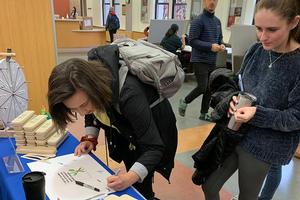Environment
Sustainability and Zero Waste Teams Spearhead Single-Use Plastic Reduction Campaign

This past November, interns from American University’s Office of Sustainability and the Zero Waste team spearheaded a university-wide waste reduction campaign. Students, faculty, and staff were asked to sign a pledge stating that they will use reusable forks, knives, and spoons instead of plastic utensils.
The purpose of the campaign was to promote greater awareness and mindfulness of the negative environmental and health impacts of single-use plastics, and equip them with an easy tool – reusable utensils – to decrease their use.
“While it’s certainly important to sort waste on campus properly – a practice we employ currently – it’s even more important to reduce the amount of waste that our community generates in the first place,” said Tacy Lambiase, Sustainability Manager.
“Decreasing the use of single-use plastics on our campus will help AU reach its goal of becoming a zero waste campus.”
To encourage the 512 participants in AU’s community to adhere to their pledge, the Office of Sustainability gave them all a set of reusable, dishwasher-safe utensils made with wheat straw housed in a carrying case. If each of the 512 people uses their reusable utensils, they could save more than 57,000 plastic utensils from being used annually.
During the campaign, the Zero Waste team ran a social media challenge using the hashtag #ForkPlastic. Anyone who posted an Instagram story featuring themselves using their reusable utensils was eligible to win a Hydro Flask.
“If even one member of the AU community uses their reusable utensils around their friends, it encourages others to start using reusables. We want to equip our community with the tools to behave more sustainably and encourage their friends and family to engage with sustainability, too,” said Lambiase.
Sustainability Intern Kira Burba added, “Waste reduction campaigns, such as our efforts to reduce single-use plastics, are important because they help make the university community aware of their consumption. Once they realize the amount of waste they produce, they can make positive changes in their lives to effect change.”